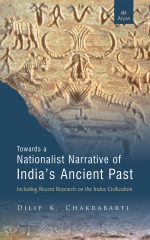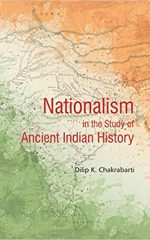Towards a Nationalist Narrative of India’s Ancient Past: Including Recent Research on the Indus Civilization
Towards a Nationalist Narrative of India’s Ancient Past: Including Recent Research on the Indus Civilization
The present volume goes on to argue that post-Independence Indian archaeologists, despite making many new discoveries, have been most unashamedly neocolonial without the least awareness of the interrelationship between archaeological data and nationalism.
The volume deals with multiple aspects of this interrelationship and undertakes a critical review of the recent research on the Indus civilization, showing that the very idea of the integrity and homogeneity of this civilization, which is the fountainhead of India’s mainstream civilization, is being currently undermined by both Indian and foreign archaeologists who consider it only a veneer on top of the regional elements.
The Battle for Ancient India: An Essay in the Sociopolitics of Indian Archaeology
The Battle for Ancient India: An Essay in the Sociopolitics of Indian Archaeology
A number of issues regarding the study of ancient India have recently emerged in the public domain. The most important of them are the Sarasvati Project, Aryan invasion theory, the textbook controversy in India and California and the language of the Indus civilization.
The intensity of debate on each of these issues is reminiscent of religious clashes. Much of this debate is also not limited to professional historians and archaeologists. The mass of data and opinions, which are currently available on the internet and have frequently been published in the media, can no longer be ignored by anybody interested in ancient India. Some professional analysis of this development has long been called for. This book is in response to this need.
Nationalism in the Study of Ancient Indian History
Nationalism in the Study of Ancient Indian History
The present volume examines the evolving research scenario and concludes that these pioneer historians never wilfully distorted any historical evidence and thus their nationalism did not stand in the way of objective historical investigations. The allegations levelled against them by communists roughly since the 1960s were nothing but propaganda ploys to draw attention to themselves as ‘progressives’ and thus capture with governmental support the country-wide institutions in the field of history .




